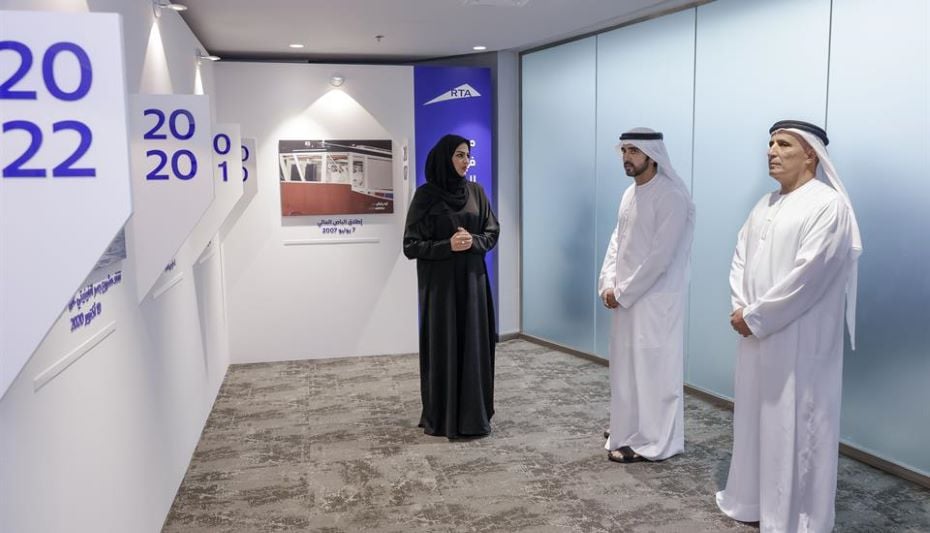Dubai’s Crown Prince, Sheikh Hamdan bin Mohammed bin Rashid Al Maktoum, who also serves as the Chairman of The Executive Council of Dubai, has approved the Dubai Marine Transport Master Plan 2030.
Sheikh Hamdan recently visited the offices of the Roads and Transport Authority (RTA) to examine the plan, where he received a briefing from Mattar Al Tayer, who holds the positions of Director-General and Chairman of the Board of Executive Directors at RTA.
The Dubai Marine Transport Master Plan 2030, as reported by the Dubai Media Office, encompasses the enhancement of the emirate’s marine transport network, a significant growth in passenger services, and the groundbreaking production of the world’s inaugural electric abra using 3D printing technology.
Detailed Insights into Dubai Marine Transport Master Plan 2030:
This strategy aims to facilitate a substantial 188 percent enlargement of the overall length of the marine transport network, extending it from 55 to 158 kilometers. Additionally, it sets its sights on a 51 percent boost in user numbers, from 14.7 million to 22.2 million annually by the year 2030.
The plan also entails an increase in transport stations from 48 to 79, situated along various points such as the Dubai Creek, Dubai Water Canal, the Arabian Gulf coastline, and several waterfront projects.
Furthermore, this comprehensive plan includes an impressive fourfold increase in passenger transport lines, from seven to 35, accompanied by a 32 percent expansion in the fleet, rising from 196 to 258 marine vessels.
RTA plans to manufacture 3D printed abra
The RTA has unveiled plans to produce the world’s inaugural electric abra using 3D printing technology, as part of a collaborative effort with the private sector.
During his visit, Sheikh Hamdan assessed this initiative, which aims to create a 3D-printed boat capable of carrying 20 passengers, featuring a design inspired by traditional abras.
This innovative approach reduces production time by 90 percent and allows for a 30 percent reduction in costs, according to Gulf Business.
Additionally, the Crown Prince examined the performance metrics of the Al Garhoud RTA Marine Maintenance Centre, the largest marine maintenance facility in the region spanning 5,000 square metres. It includes five distinct workshops, a 250-metre pier, a dock accommodating boats up to 32 metres in length, a boat crane with a lifting capacity of up to 100 tonnes, storage areas, zones designated for marine and external tasks, administrative spaces, and an employee rest area.
This facility can service 16 boats simultaneously and achieves a significant 50 percent reduction in maintenance expenses.
Furthermore, Sheikh Hamdan received a briefing on the predictive maintenance system for water transport modes, which included the installation of remote monitoring devices and sensors on these vessels.
The RTA is also in the process of developing a real-time monitoring system driven by artificial intelligence to analyze data, predict potential faults, and proactively plan for spare part requirements.
Autonomous abras
Sheikh Hamdan was also briefed on the trial operation of the world’s inaugural autonomous electric abra.
During its initial phase, this abra successfully achieved Level 4 on the International Driving Automation Index, which consists of six levels in total.
The trials involved completely autonomous operation of the abra, without the need for a captain, on the route between Al Jaddaf Station and Dubai Festival City Marine Transport Station, maintaining a 100 percent route accuracy. Ongoing efforts are in progress to reach Level 5 on the Index by the year 2024.
Al Tayer mentioned that the autonomous electric abra boasts numerous advanced features, including zero carbon emissions, cost savings of 30 percent in operations and maintenance, and the elimination of noise compared to diesel-powered abras.
During the visit, the Crown Prince also met with Hanadi Mohammed Al Doseri, who holds the distinction of being the first Emirati woman to captain a mass marine transport vessel.
Al Doseri shared her journey towards acquiring the qualifications required to pilot ships weighing less than 200 tonnes on coastal journeys. Sheikh Hamdan praised Al Doseri for her remarkable achievements.
Al Doseri’s qualifications encompass five safety training certificates in accordance with the International Convention on Standards of Training, Certification, and Watchkeeping for Seafarers.
Additionally, she has successfully completed three months of maritime service and holds two specialized training certificates.
Furthermore, she is licensed to pilot sea-faring craft in the 12-meter and 24-meter categories and is currently working towards securing a license for piloting ships weighing less than 200 tonnes on coastal routes.


